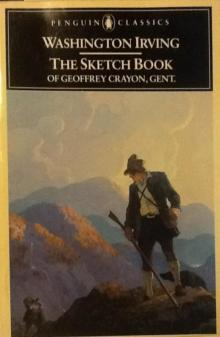The Sketch-Book of Geoffrey Crayon


Author: Washington Irving
Category: Fiction
Published: 2000
Series:
View: 362
Read OnlineThe Sketch Book of Geoffrey Crayon, Gent. THE VOYAGE. Ships, ships, I will descrie you Amidst the main, I will come and try you, What you are protecting, And projecting, What’s your end and aim. One goes abroad for merchandise and trading, Another stays to keep his country from invading, A third is coming home with rich and wealthy lading. Hallo! my fancie, whither wilt thou go? OLD POEM. To an American visiting Europe, the long voyage he has to make is an excellent preparative. The temporary absence of worldly scenes and employments produces a state of mind peculiarly fitted to receive new and vivid impressions. The vast space of waters that separate the hemispheres is like a blank page in existence. There is no gradual transition by which, as in Europe, the features and population of one country blend almost imperceptibly with those of another. From the moment you lose sight of the land you have left, all is vacancy, until you step on the opposite shore, and are launched at once into the bustle and novelties of another world. In travelling by land there is a continuity of scene, and a connected succession of persons and incidents, that carry on the story of life, and lessen the effect of absence and separation. We drag, it is true, “a lengthening chain” at each remove of our pilgrimage; but the chain is unbroken; we can trace it back link by link; and we feel that the last still grapples us to home. But a wide sea voyage severs us at once. It makes us conscious of being cast loose from the secure anchorage of settled life, and sent adrift upon a doubtful world. It interposes a gulf, not merely imaginary, but real, between us and our homes—a gulf, subject to tempest, and fear, and uncertainty, rendering distance palpable, and return precarious. Such, at least, was the case with myself. As I saw the last blue lines of my native land fade away like a cloud in the horizon, it seemed as if I had closed one volume of the world and its concerns, and had time for meditation, before I opened another. That land, too, now vanishing from my view, which contained all most dear to me in life; what vicissitudes might ...
 The Early Stories: 1953-1975
The Early Stories: 1953-1975 Lea
Lea The Monastery
The Monastery Lucky Starr and the Oceans of Venus
Lucky Starr and the Oceans of Venus Men of Inked Christmas Novella
Men of Inked Christmas Novella By Any Name
By Any Name Dashing Through the Snow
Dashing Through the Snow The Sight of the Stars
The Sight of the Stars